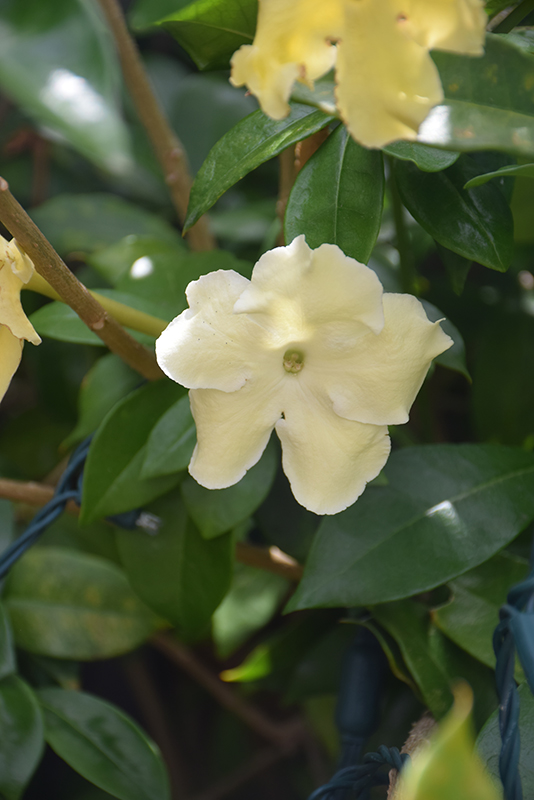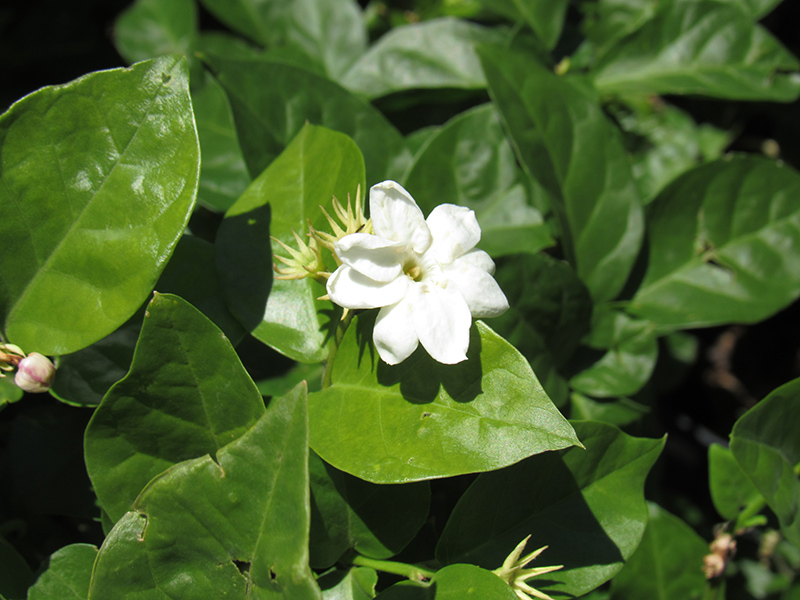Plant Finder
Height: 10 feet
Spread: 3 feet
Sunlight:
![]()
![]()
Hardiness Zone: (annual)
Other Names: Sambac Jasmine
Description:
Climbing habit perfect for walls, trellises and pergolas; gently prune to form a shrub; proper fertilizing and pruning will maximize blooming; incredible display of small, star-shaped flowers with a heavenly aroma
Ornamental Features
Arabian Jasmine is covered in stunning fragrant white star-shaped flowers held atop the branches from late spring to late summer. The flowers are excellent for cutting. Its glossy oval pinnately compound leaves remain dark green in color throughout the year.
Landscape Attributes
Arabian Jasmine is a dense multi-stemmed annual with a ground-hugging habit of growth. Its medium texture blends into the garden, but can always be balanced by a couple of finer or coarser plants for an effective composition.
This plant will require occasional maintenance and upkeep, and should only be pruned after flowering to avoid removing any of the current season's flowers. It is a good choice for attracting hummingbirds to your yard. Gardeners should be aware of the following characteristic(s) that may warrant special consideration;
- Self-Seeding
Arabian Jasmine is recommended for the following landscape applications;
- Mass Planting
- Hedges/Screening
- General Garden Use
- Container Planting
Planting & Growing
Arabian Jasmine will grow to be about 10 feet tall at maturity, with a spread of 3 feet. As a climbing vine, it should either be planted near a fence, trellis or other landscape structure where it can be trained to grow upwards on it, or allowed to trail off a retaining wall or slope. Although it's not a true annual, this plant can be expected to behave as an annual in our climate if left outdoors over the winter, usually needing replacement the following year. As such, gardeners should take into consideration that it will perform differently than it would in its native habitat.
This plant does best in full sun to partial shade. It does best in average to evenly moist conditions, but will not tolerate standing water. It is not particular as to soil type or pH. It is somewhat tolerant of urban pollution, and will benefit from being planted in a relatively sheltered location. Consider applying a thick mulch around the root zone over the growing season to conserve soil moisture. This species is not originally from North America. It can be propagated by cuttings.
Arabian Jasmine is a fine choice for the garden, but it is also a good selection for planting in outdoor pots and containers. Because of its spreading habit of growth, it is ideally suited for use as a 'spiller' in the 'spiller-thriller-filler' container combination; plant it near the edges where it can spill gracefully over the pot. It is even sizeable enough that it can be grown alone in a suitable container. Note that when growing plants in outdoor containers and baskets, they may require more frequent waterings than they would in the yard or garden.
Disclaimer - Rutgers Landscape & Nursery Plant Finder is an online resource representing many of the varieties that we carry over the course of the season, and is intended for informational purposes only. Inventory varies seasonally, so we cannot guarantee that every plant will be in stock at all times - please contact Rutgers directly for current availability.


